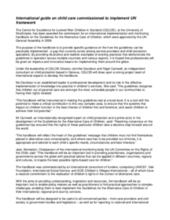The Centre for Excellence for Looked After Children in Scotland (CELCIS), at the University of Strathclyde, has been awarded the commission for an international implementation and monitoring handbook on the Guidelines for the Alternative Care of Children, which were approved by the UN General Assembly in 2009.
The purpose of the handbook is to provide specific guidance on the how the guidelines can be practically implemented - a gap that currently exists among service providers and child protection specialists. By providing illustrative and realistic examples of existing practices that demonstrate the guidelines in operation across multiple countries and various regions, it is hoped that professionals will be given an impetus and innovative means for implementing them around the globe.
The handbook will be designed to be useful to all concerned parties – from care providers and civil society to government bodies and legislators – as well as for reporting to national and international monitoring bodies.
This will be underpinned by the overarching principles and individual articles of the UNCRC. It will provide contextual information, links to policy and inspiring practice examples and will signpost other resources.
The project team is supported by an international steering group consisting of ATD 4th World, Better Care Network, EveryChild,International Social Service, RELAF, SOS Children’s Villages International and UNICEF.
Mr Cantwell, an internationally-recognised expert on child protection and a prime actor in the development of the Guidelines for the Alternative Care of Children, said:
“Reaching consensus on the guidelines has ensured that the rights of these particular children take a decisive step forward around the world.The handbook will reflect the heart of the guidelines’ message that children must not find themselves placed in alternative care unnecessarily; and where care has to be provided out-of-home, it is appropriate and tailored to each child’s specific needs, circumstances and best interests.”

